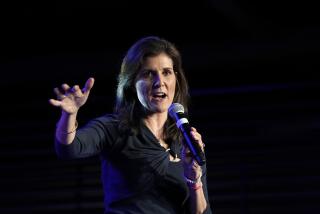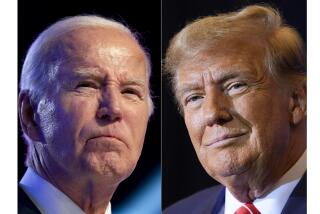Quayle Won’t Seek GOP Bid for Presidency
- Share via
WASHINGTON — Further contracting an already narrow Republican field, former Vice President Dan Quayle unexpectedly announced Thursday that he would not seek the 1996 GOP presidential nomination.
Less than three weeks ago, Quayle declared in an Indianapolis speech that he would enter the contest as a champion of conservative social values. But in a statement Thursday, he said he does not want to put his family through “the disruption (of) . . . a third straight national campaign.”
With Quayle’s departure, the Republican field continued to shrink, despite ever-expanding party optimism about its prospects against President Clinton next year. Earlier this year former Cabinet secretaries Dick Cheney and Jack Kemp took themselves out of consideration, citing the contest’s huge fund-raising demands.
These high-profile departures underscore the extent to which the acceleration of the 1996 primary calendar is changing the fundamental dynamics of the presidential race. Republican strategists commonly assume that serious candidates need to raise as much as $20 million to $25 million this year, largely because so many states, including behemoths like New York and California, have moved up their primaries to the front end of the schedule next spring.
*
That enormous financial pressure appears to be assuming the function that voters in Iowa and New Hampshire, the traditional first contests, have historically played: thinning out the presidential field.
“The 1996 Republican primary calendar and the subsequent implications for our candidates in fund raising has taken the place of Iowa and New Hampshire in winnowing the field,” according to Neil Newhouse, a GOP pollster whose firm has worked for the exploratory committee of Senate Majority Leader Bob Dole (R-Kan.).
Though Quayle in his statement said he is convinced that he could raise “the necessary funds” to compete in the race, advisers said that the financial pressure weighed heavily on his mind.
“We were never out there raising money,” said Mark Goodin, a Republican strategist who had been advising Quayle. “In the end, he said: ‘Look, I’m behind the curve, it would take an awful lot of energy and time to even catch up.’ ”
Surprised by the announcement, many Republicans speculated that Quayle’s decision may also have been related to problems with his health. He has been hospitalized twice recently, for treatment of blood clots in his lung and then removal of his appendix, after doctors found a rare benign tumor. But Goodin insisted that the decision was “absolutely not” affected by Quayle’s health.
Another adviser said that Quayle had received “a clean bill of health” from his physicians, though it may be that in months to come “Quayle may be glad that he didn’t strain his health, didn’t push the envelope.”
Whatever his reasons, Quayle’s decision left the GOP with just three certain candidates: Texas Sen. Phil Gramm and former Tennessee Gov. Lamar Alexander, who plan to announce their candidacies later this month, and Sen. Dole, who has said he will formally enter the race in April.
Moderate Pennsylvania Sen. Arlen Specter and conservative columnist Patrick J. Buchanan are actively exploring the race, and Indiana Sen. Richard G. Lugar said last week that he will test the waters. Also circling the starting gate are two potential long-shot candidates: former State Department official Alan Keyes and Orange County Rep. Robert K. Dornan.
*
In a sense, Quayle’s departure could help all of the remaining contenders by removing a competitor for money and the attention of voters and the media. Newhouse said a survey by his firm in December found that a plurality of Quayle supporters preferred Dole as their second choice. Others speculated that the departure would most benefit Gramm by eliminating his principal competitor for the allegiance of the party’s most conservative wing.
The most tangible effect of Quayle’s departure, though, may be to intensify speculation about other potential entries to the race. “I think the race will be bigger than it is right now,” Kemp said at a conservative political conference in Washington.
At the top of the list of party leaders still believed to be considering the race are governors Pete Wilson of California, William F. Weld of Massachusetts and Tommy G. Thompson of Wisconsin. Faint speculation also attaches to House Speaker Newt Gingrich of Georgia and former Secretary of State James A. Baker III.
To a large extent, Quayle’s decision--like the earlier withdrawals of Cheney, Kemp and even former Education Secretary William J. Bennett--reflects uniquely personal calculations. With his high name identification, Quayle ran well in national surveys of Republicans.
But after his error-prone tenure as vice president, Quayle faced continued doubts in the party about his ability to command broad support. Some GOP sources said that Quayle had received discouraging responses as he sounded out potential political and financial backers around the country over the last several weeks. In a recent straw poll in Arizona, where Quayle has strong family ties, he attracted only minimal backing.
Money has always been critical to success in presidential politics, but the compression of the primary calendar has escalated its importance even further. In the past, candidates without access to huge sums could operate on the assumption that a victory in the early primaries could be rewarded with a subsequent fund-raising windfall.
Now, though, the primaries cascade so quickly after New Hampshire--New York just 17 days later, the Southern gantlet of Super Tuesday just five days after that--that Republicans conventionally assume there is no longer enough time to follow that strategy.
Times staff writers Robert Shogan and David Lauter contributed to this story.
More to Read
Get the L.A. Times Politics newsletter
Deeply reported insights into legislation, politics and policy from Sacramento, Washington and beyond. In your inbox three times per week.
You may occasionally receive promotional content from the Los Angeles Times.










